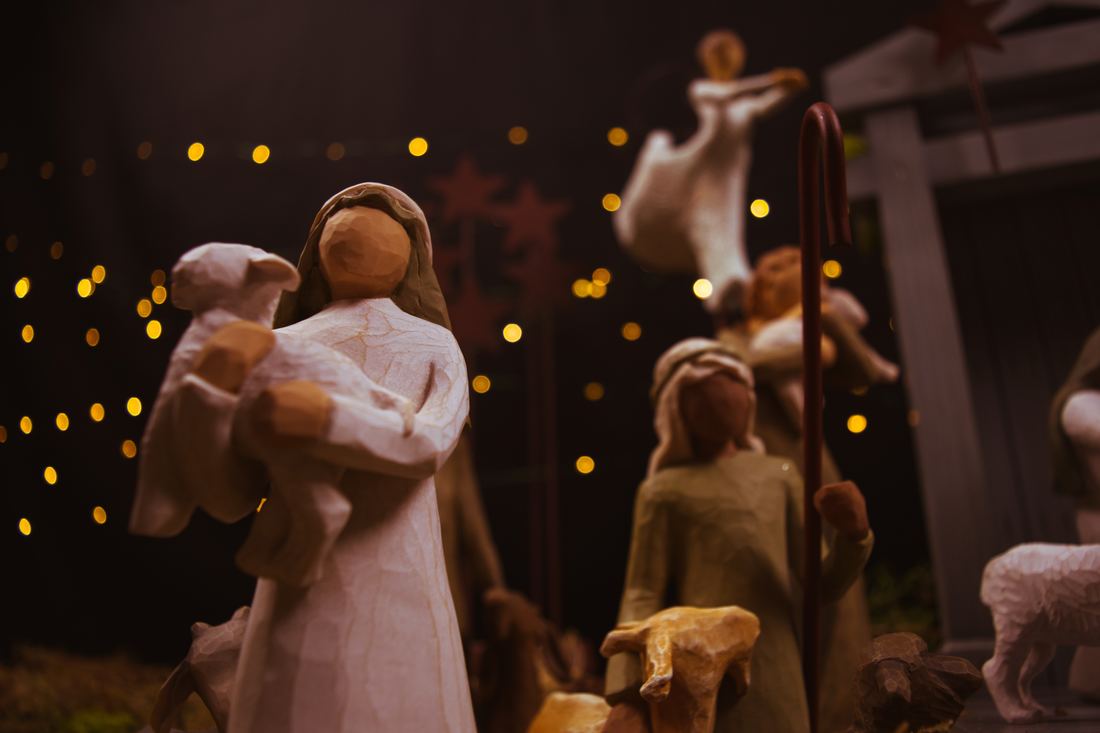|
Walking Points: Reflection Questions and Next Steps
Coming Home: The Yes of Obedience Luke 1:26-38 Pastor Bruce wrote, “Mary and Joseph are the very first human beings confronted with the reality of Jesus’ advent into our world. Into their world. Two things stand out in each experience. First, obedience is not just keeping the rules or following a code. It is – in essence – an intentional assent to the will of God. Obedience is saying yes to God’s will for e. Secondly obedience is action. It is something that we do; it is not only an interior disposition, but it leads me to specific steps. Note: this doesn’t mean we have all the answers. It doesn’t mean we know how it’s going to play out. May and Joseph were going on scant information that seemed impossible and likely made their heads swirl. Instead of certitude, they were left with trust. And trust makes a place for the Savior.” Below are some “Walking Points,” which are questions for reflection and next steps for you to consider taking during this Advent season and beyond. You can use them for your personal devotional time or with others in a small group. 1. When the angel appeared to Mary to tell her the news that she was chosen of God to be the mother of Jesus, Luke 1:29 says, “…she was greatly troubled at the saying, and tried to discern what sort of greeting this might be.” · What are two or three ways you discern God’s will for your life? Why are those good ways to discern God’s will? · If you are meeting in a group with others, share with them an experience in your life when you discerned God’s will for your life. Was it hard or easy? How did you go about it? · Eventually you had to step out in trust. Was that a scary time? Why or why not? What did you learn from the experience? 2. Read Luke 1:30-36. Talk about impossible! Now read verse 37. · How does knowing who God is enable you to better trust him during tough times. · What are some ways we can better know God? · List three attributes or characteristics of God that you cling to during tough decisions in your life. Why did you choose those three? 3. Now read Luke 1:38. · Spend some time praying privately, or together in your group, for the Lord to fill you with his Spirit to enable you to discern and respond to God’s call in your life, as Mary did.
0 Comments
Three Anchors of Hope
There are times in our lives when our most deeply held values and beliefs are tested with fire. This is God’s refining (or pruning) process. With it comes genuine pain, heartache, and difficulty. Yet, ideally, the person who comes out the other side is closer to God and the likeness of Christ. It is during times like these we discover if we really believe what we say we believe. Over the last twenty-something years, I’ve been greatly influenced by Scripture and godly authors who have deepened my understanding and conviction regarding three great anchors of hope for tough times. I have come to a place in my life in which I embrace these key truths as the only way in which I am able to trust God, regardless of the circumstances. They are, 1. God is good and loves me very much. Because this is true, I know God has my best interest at heart. He is for me and not against me. 2. God is all-wise. Therefore, not only does God know what my best interest is, but he also knows the best way to bring my best interest about. 3. God is sovereign. God is in control of his universe. Therefore, not only does he have my best interest at heart, but he can bring it about. Trust in the Lord I believe those three affirmations with all my heart. My belief is no mere intellectual acknowledgement. These three truths are in my bloodstream. Thus, because I so deeply believe these things are true, I know I can always trust God. The God described in those three statements is the awesome God of Holy Scripture, the God and Father of our Lord, Jesus Christ. Surely that is the God King Solomon had in mind when he wrote these words, Proverbs 3:5 – Trust in the Lord with all your heart and lean not on your own understanding; Solomon goes on to say we are not to be wise in our eyes. But that’s exactly what we do when we suppose, even for a second, that we know better than God. It’s laughable to think we know what our best interest is in any situation, no matter how trivial. Among our many deficiencies, we have not been given an omniscient mind that knows all possible scenarios and outcomes of those scenarios. Such knowledge is essential in knowing how to discern what the very best plan for our life would be. It really is arrogant to lean on our own understanding. Think about the words “lean” or “depend.” They carry with them the notion of putting one’s weight on or against something that will help provide stability. Would you really prefer to put all your weight against something weak, fragile, and incapable of bracing you? Instead, wouldn’t you rather put your weight against an immovable, utterly dependable, trustworthy Rock? That’s the God of Holy Scripture. Yet, how often do we turn to our own wisdom and understanding? Enter, King Asa I had something of a roller-coaster ride of emotions when I first read about good King Asa in 2 Chronicles. Because good kings are so few and far between in the Old Testament, I celebrated his faithfulness to God. Notice what we read about him in the following verses. 2 Chronicles 14:2 – Asa did what was good and right in the eyes of the Lord his God. 2 Chronicles 14:5 – He removed the high places and incense altars in every town in Judah, and the kingdom was at peace under him. 2 Chronicles 15:1-2 – The Spirit of God came upon Azariah son of Oded. [2] He went out to meet Asa and said to him, “Listen to me, Asa and all Judah and Benjamin. The Lord is with you when you are with him. If you seek him, he will be found by you, but if you forsake him, he will forsake you. 2 Chronicles 15:8 – When Asa heard these words and the prophecy of Azariah son of Oded the prophet, he took courage. He removed the detestable idols from the whole land of Judah and Benjamin and from the towns he had captured in the hills of Ephraim. He repaired the altar of the Lord that was in front of the portico of the Lord’s temple. 2 Chronicles 15:16-17 – King Asa also deposed his grandmother Maacah from her position as queen mother, because she had made a repulsive Asherah pole. Asa cut the pole down, broke it up and burned it in the Kidron Valley. [17] Although he did not remove the high places from Israel, Asa’s heart was fully committed to the Lord all his life. But Then Verse 17b sums it up all so nicely. I couldn’t help but cheer as I read those verses, asking God to make my heart just as fully committed to him as King Asa’s. But then… If you don’t already know the story, then you experience the rug getting suddenly yanked out from underneath you. For in 2 Chronicles 16:1-6, we learn King Asa, who had placed his trust in the Lord, now put his trust in his own wisdom and ingenuity. To make matters worse, his plan seemed to work. He must have thought all was well. Yet we learn of the consequences of his plan in 2 Chronicles 16:7-9, At that time Hanani the seer came to Asa king of Judah and said to him: “Because you relied on the king of Aram and not on the Lord your God, the army of the king of Aram has escaped from your hand. [8] Were not the Cushites and Libyans a mighty army with great numbers of chariots and horsemen? Yet when you relied on the Lord, he delivered them into your hand. [9] For the eyes of the Lord range throughout the earth to strengthen those whose hearts are fully committed to him. You have done a foolish thing, and from now on you will be at war.” What Could Have Been These words of Hanani could have served as an impetus for repentance. The opportunity was there for Asa to see the foolishness of his ways and get back on track with God. He could have admitted his rebellion and returned to God. Asa would have been no different than any of us who have wandered off the right path from time to time as we sought our own way, according to our own wisdom. Our loving and merciful God is always there at the ready to offer pardon and renewal. I’m astounded at how patient God is with me in my own life. But Asa went a different way. He chose to respond in anger to the reprimand. He “shot the messenger” rather than taking heed to the message (v. 10). Thus, we read these sad words in verses 12-13, In the thirty-ninth year of his reign Asa was afflicted with a disease in his feet. Though his disease was severe, even in his illness he did not seek help from the Lord, but only from the physicians. [13] Then in the forty-first year of his reign Asa died and rested with his fathers. Sad indeed… even tragic. Finishing Well I have a great desire to run the race of faith to its completion and finish well. Don’t you? But that journey is a lifetime pursuit. We must persevere. No matter how much God has blessed us we must never presume upon his grace. We must not assume God owes us any good thing. We must beware of taking our lives into our own hands and depending on our own wisdom to see our way through, even when (especially when) things seem to be going so well. It’s during those exceedingly tough times in life you discover who or what you’ve really been placing your trust in all along. Instead, a lifetime of humility before God is called for. Hosea reminds us in 14:9, Who is wise? He will realize these things. Who is discerning? He will understand them. The ways of the Lord are right; the righteous walk in them, but the rebellious stumble in them. Zephaniah too, calls us to seek humility. Zephaniah 2:3 – Seek the Lord, all you humble of the land, you who do what he commands. Seek righteousness, seek humility; perhaps you will be sheltered on the day of the Lord’s anger. I want to finish well. Whether my last day on earth is today or 50 years from now, I want to finish well. I want to hear those words every follower of Jesus Christ desires to hear, Matthew 25:21 – “…’Well done, good and faithful servant! You have been faithful with a few things; I will put you in charge of many things. Come and share your master’s happiness!’ Therefore, between today and “that day” I must trust in the Lord with all my heart and lean not on my own understanding. In all my ways I must acknowledge him and he will make my paths straight. Walking Points · What are some obstacles in your life that make it difficult to trust God during the good times? · During the tough times? · What are some spiritual practices you can begin today to help you grow in your ability to trust God? · Set a meeting with a godly friend and share your ideas and ask for prayer. Prayer Gracious God and Father of our Lord and Savior, Jesus Christ, I praise you for your goodness, sovereignty, and wisdom. Not only do you want what is best for me, you know what is best for me, and the best way to bring it about. Moreover, because you are sovereign, you are able to bring it about. Thank you! I pray, O Lord, that you will help my children to love you more and more in knowledge and depth of insight. Help them to always know what is best and to continually grow in purity and blamelessness. May their lives ever bring you glory and praise. In Christ I pray. Amen. This Week’s Prayer Guide [You can use this prayer guide in your own personal prayer time. However, I encourage you to use it with a group of Christian men. Each week you should spend time praising God for who he is, confessing your sin to him (be specific) as well as expressing gratitude to him for his gracious forgiveness. Also, don’t forget to thank God for the many ways he has poured out his goodness in your life. Then, focus on the following areas of supplication, which will change from week to week.] Petitions – prayers for yourself · Spiritual Warfare · Growth in Christlikeness · Increasing faithfulness in the spiritual disciplines · My health · For my ordinary appointments and activities to become divine appointments and activities. · Other needs Intercession – prayers for others · My Family · Mercy for those who are poor and hungry · Justice for those who are oppressed and persecuted · Love for those who oppress and persecute others · Peace for those in the midst of war, crime, and violence · Other needs Our Need
Among the characteristics we could cite, our forbearers in the faith had at least two qualities about them that enabled them to stand against great odds. These saints of the covenant had faith and courage. There’s a lack in our day of both. More often than I care to think about, doubt and fear have won the day and left God’s saints in a puddle of impotence and despair. I know this has been true of my own life. But this should never be the case for God’s people. Scripture offers us some encouraging examples of those who trusted God and were able to face seemingly insurmountable odds. Example 1: Caleb When Moses sent an expedition to Canaan to explore what awaited God’s children in the land of promise, the report confirmed all God had promised – it was lush and flowed with milk and honey, as advertised. But there was a catch. There was also a huge obstacle before them. In the land there were “giants” who made the Israelites seem like hobbits in a land of orcs. The report from the expedition team was, “We seemed like grasshoppers in our own eyes, and we looked the same to them” (Numbers 13:33). But this pessimistic report was not shared by all. For in Numbers 13:30 we read, Then Caleb silenced the people before Moses and said, “We should go up and take possession of the land, for we can certainly do it.” Caleb had faith in God and his covenant promises, and therefore, could be as courageous as Frodo and Sam in the land of Mordor. Example 2: David David faced similar circumstances later in redemptive history, with a similar response. As the Israelites shook in their sandals before the great Goliath and the Philistine horde, the young shepherd boy looked on in bewilderment. In what seemed like arrogance at worst and naiveté at best, this “king-to-be” couldn’t understand why his people had not already taken the uncircumcised behemoth apart – especially in light of Goliath’s jeering and insolence before the living God. David queried, “Who is this uncircumcised Philistine that he should defy the armies of the living God?” (1 Samuel 17:26) And so, like Caleb before him, David volunteered to take Goliath on. So what if he seemed like a grasshopper before this giant of a man, all nine feet of him. David drew courage from his faith in the One who had never failed him before. Your servant has killed both the lion and the bear; this uncircumcised Philistine will be like one of them, because he has defied the armies of the living God. The Lord who delivered me from the paw of the lion and the paw of the bear will deliver me from the hand of this Philistine.” (1 Samuel 17:36-37) The Foundation for Faith and Courage With faith and courage David faced the giant, and the rest, as we say, is history. What was the foundation for such faith and courage in the lives of Caleb and David? We are told in Jeremiah 1:8 and 19. Do not be afraid of them, for I am with you and will rescue you,” declares the Lord. They will fight against you but will not overcome you, for I am with you and will rescue you,” declares the Lord. Caleb and David knew in their day what God told Jeremiah in his. That is, God’s people will be opposed. That’s a given. We will seem like grasshoppers in comparison to our enemies. The “apparent” odds will be overwhelmingly against us. But God calls the weak, poor, small, seemingly insignificant hobbits of this world to serve as his subjects, his knights, to advance his Kingdom, even in the face of the enemy (perhaps especially so). Who Are Your Giants? Philistines and other barbarians continue to surround God’s people today in a variety of ways. Yet we are called to stand firm in the face of such opposition because Caleb and David’s God is also our God. Is anything greater than the covenant-making, covenant-keeping Lord of Glory? It is this very God who promised never to forsake us. That alone is grounds for faith and courage in the midst of insurmountable odds. Therefore, my dear brothers, stand firm. Let nothing move you. Always give yourselves fully to the work of the Lord, because you know that your labor in the Lord is not in vain. (1 Cor. 15:58) Be on your guard; stand firm in the faith; be men of courage; be strong. (1 Cor. 16:13) Walking Points · Who or what are some of the Philistines that face Christians in our culture today? How can you equip yourself and your church to stand firm and remain faithful against such opposition? · On a more personal level, who (or what) are the giants in your life, opposing your walk with Christ? What is it about them that causes you to fear and turn the other way? · What is a strategy you could start using today to help you face your giants with faith and courage? · Of course, you should never travel alone. Who are two or three brothers you could ask to pray for you, offer you wisdom, encourage you and help hold you accountable? Ask them to join you today. Prayer Sovereign God, the battle is yours. You call me to trust you and participate in the battle, but you have already declared victory. Why then do I, all too often, tuck tail and run? Give me, I humbly pray, the faith and courage of Caleb and David. Help me to fear others so little because I fear you so much. Fill me with your Spirit and enable me to know you are with me. Then, enable me to face the kingdom of darkness and wickedness with the confidence of being your son. Because, if you are for me, who can possibly be against me? In Christ I pray. Amen. This Week’s Prayer Guide [You can use this prayer guide in your own personal prayer time. However, I encourage you to use it with a group of Christian men. Each week you should spend time praising God for who he is, confessing your sin to him (be specific) as well as expressing gratitude to him for his gracious forgiveness. Also, don’t forget to thank God for the many ways he has poured out his goodness in your life. Then, focus on the following areas of supplication, which will change from week to week.] Petitions – prayers for yourself · Spiritual Warfare · Growth in Christlikeness · Increasing faithfulness in the spiritual disciplines · My health · For my ordinary appointments and activities to become divine appointments and activities. · Other needs Intercession – prayers for others · My Family · Mercy for those who are poor and hungry · Justice for those who are oppressed and persecuted · Love for those who oppress and persecute others · Peace for those in the midst of war, crime, and violence · Other needs Exodus 4:11-12 – The Lord said to him, “Who gave man his mouth? Who makes him deaf or mute? Who gives him sight or makes him blind? Is it not I, the Lord? [12] Now go; I will help you speak and will teach you what to say.”
Luke 12:11-12 – “When you are brought before synagogues, rulers and authorities, do not worry about how you will defend yourselves or what you will say, [12] for the Holy Spirit will teach you at that time what you should say.” God’s Mouthpiece In Exodus 4, God called Moses to be his mouthpiece. Moses would represent God to both the Egyptians as well as the Israelites. Moses would speak on God’s behalf and utter the very message God told him to pass on. Some believe that, when Moses first declined God's offer, he was practicing false humility, common in his day. Others believe he wasn't very eloquent and was simply scared. Who knows? Whatever the reason, it seems plausible he may have been a bit overwhelmed at the prospect of speaking to Pharaoh. Who wouldn’t? I’ve been there. Such fear comes from relying too much upon myself and not enough on God. God says as much with these words, “Who gave man his mouth? Who makes him deaf or mute? Who gives him sight or makes him blind? Is it not I, the Lord? (verse 11) God’s the sovereign One in the equation, not me. Our Lord made a similar point in Luke 12 when he told his disciples they would be persecuted for following him. How would they respond when they were caught and tried by the authorities? How would they reply to the charges? Just think of the pressure and stress. Would fear overcome them? Or would they find the right words at the right moment? Jesus told them not to worry about such things. He said, “When you are brought before synagogues, rulers and authorities, do not worry about how you will defend yourselves or what you will say, (verse 11) Our Default Excuse Over the years there have been many people who have told me they do not share their faith because they are “afraid they won’t know what to say.” How often have we remained silent when we could and should have lovingly confronted a friend or family member for a particular sin in their lives? How many times have we avoided offering counsel to someone making a major life-decision because the pressure was simply too great? We’re afraid we’ll get tongue-tied for Jesus. Those, and other examples, are often the result of leaning too heavily upon our own abilities (or fearing our inabilities) rather than trusting God and his Spirit to speak through us. But notice the reasons both God the Father in Exodus, and Jesus in Luke’s Gospel, give for placing our trust in God: Now go; I will help you speak and will teach you what to say.” (Exodus 4:12) for the Holy Spirit will teach you at that time what you should say.” (Luke 12:12) Trust God and Speak You see, God never requires anything from us for which he does not also equip us. God wants us to witness to unbelievers as well as to minister to fellow believers. We are his hands and feet. More than that, we are his voice. We are not called to share our own opinions, however, but his words and counsel. Of course, if we aren’t listening to God through prayer and the study of his Word, then it is indeed doubtful we will have much to offer anyone. And yet, as we dig into his Word and meditate upon what he has revealed to us, we will hear not only what he is saying to us, but also what he wants us to share with others. And that’s more than worth our effort. Walking Points · Have you ever been frozen in fear of what to say to someone who asked you why you were a Christian? · Or, have you not known how to counsel a friend who asked you for advice concerning a tough life-situation? · Did either of those experiences make you more or less likely to “speak for God” when future opportunities presented themselves? Why? · Do you think you were leaning too heavily upon yourself? Your abilities? · A mentor of mine once told me there was no shame in being asked a question for which I did not have an answer… the first time. However, he said, we never want to be asked the same question again without having prepared ourselves to answer it. What are three things you can start doing today to prepare yourself to better communicate God’s truth to another person when the next opportunity presents itself? Prayer Heavenly Father, I am grateful you have promised to always be with me. I am also thankful that both of today’s Scripture verses indicate you will speak through me when I have opportunities to be your ambassador to others. Please give me your peace and help me to not worry about how eloquent or clever I come across to others. Instead, let my greatest concern be to represent you faithfully out of love for others. Remind me that it will be your Holy Spirit and not my abilities that will bring a person to Christ or provide direction or comfort at the needed moment. And while you still call me to be a part of what you’re doing in the lives of others, let me remember to trust in you at all times and not presume it’s all up to me. And lastly, gracious Lord, encourage and humble me with the truth that if you can speak through the mouth of a donkey, you can speak even through me. In Christ I pray. Amen. This Week’s Prayer Guide [You can use this prayer guide in your own personal prayer time. However, I encourage you to use it with a group of Christian men. Each week you should spend time praising God for who he is, confessing your sin to him (be specific) as well as expressing gratitude to him for his gracious forgiveness. Also, don’t forget to thank God for the many ways he has poured out his goodness in your life. Then, focus on the following areas of supplication, which will change from week to week.] Petitions – prayers for yourself · Give me greater love for those who are hard to love. · Help me to be compassionate and kind to those in need, even when it’s inconvenient. · Pour out upon me your courage and boldness to love those who do not know you and to share with them your Gospel, in word and deed. · Today’s events and interactions with others, planned and unplanned · Other needs Intercession – prayers for others · My family · My family and friends who do not have a saving relationship with Christ · For those in my other spheres of influence who do not know Christ · For evangelists around our city, country, and world who risk much in sharing the good news of Jesus Christ with those who are lost · Other needs John 4:50 - Jesus replied, “You may go. Your son will live.” The man took Jesus at his word and departed.
If the Royal Official Could The royal official didn’t first wait for a miracle before he believed. He didn’t wait for Jesus to first “prove himself” worthy of trust. He took Jesus at his word. He believed Jesus. Jesus told the man his dying son would live. That was all the official needed from the Lord. To be sure, Jesus didn’t owe the man such kindness, but he was pleased to bless him anyway. That’s the definition of grace. How I wish this verse described me more. To take that step of faith, without prior confirmation of the desired result, can be frightening. Yet I sometimes find myself still wanting that confirmation in advance. Sometimes the Lord is pleased to throw me a bone, in spite of my small faith. But he would rather have me remember the hundreds upon hundreds of ways he has already proved himself capable and faithful to me and my loved ones throughout my life. A Work in Progress And yet I am encouraged. Despite my shortcomings the Lord is still drawing me closer to himself and conforming me more and more to the image of his Son. Slowly (so very slowly) I am maturing in my faith. The trust I long for comes more often than when I first began my pilgrimage. Is that your story too? Can you relate to that? How precious it is to believe, and then have the eyes to see the blessing and the hands to receive it. The royal official believed first, then experienced the miracle. This isn’t a presumptuous faith, holding God to promises he never made. It is a dependent faith, one that cries out to God, “My hope is in you and you alone O Lord”. Prayer and Scripture must undergird our growth in Christ. Reading God’s Word, reminding ourselves daily of his goodness and greatness, and then praying and meditating upon it builds us up with encouragement and confidence for both present and future faith. And this is needed. With such confidence in God, many throughout Scripture were able to face impossible odds and come out victorious on the other side. The nature of our victories may vary, but we too may be confident when we take the Lord at his Word. Walking Points · What’s the hardest part for you about trusting God? · In what situations do you find yourself wanting that “prior confirmation” before stepping out in faith and trust? Why do you think that is? · What are some things you can put in place today to help you grow in your ability to take the Lord at his Word in your daily life? · Tell a fellow Christian your plan and begin praying together for your faithfulness to grow. Prayer Trustworthy God, to whom else shall I turn? You alone have the words of eternal life. You alone are worthy of my hope. Forgive me for those times when I have not trusted you, when I have first turned to other places and people to meet my needs. Out of pure grace you have been faithful to me and my loved ones time and time again. Your track record in my life is long and spotless. And yet, my faith in you can still be feeble and fleeting. Forgive me. Please give me greater confidence in you, a longer memory of your great work in my life, and help me to draw closer to you, that I might know you better and love you more. In Christ I pray. Amen. This Week’s Prayer Guide [You can use this prayer guide in your own personal prayer time. However, I encourage you to use it with a group of Christian men. Each week you should spend time praising God for who he is, confessing your sin to him (be specific) as well as expressing gratitude to him for his gracious forgiveness. Also, don’t forget to thank God for the many ways he has poured out his goodness in your life. Then, focus on the following areas of supplication, which will change from week to week.] Petition – prayers for yourself · Help me to mature in my faith and to increasingly please God by my thoughts, words, and deeds. · Particular struggles in various relationships · My activities for this day · Other needs Intercession – prayers for others · My Family · My local church · My denomination · Para-church ministries, particularly Christian education and discipleship · Evangelistic ministries · Other needs |
Click the images above to learn more about my books for men.
Archives
April 2019
Categories
All
|







 RSS Feed
RSS Feed
